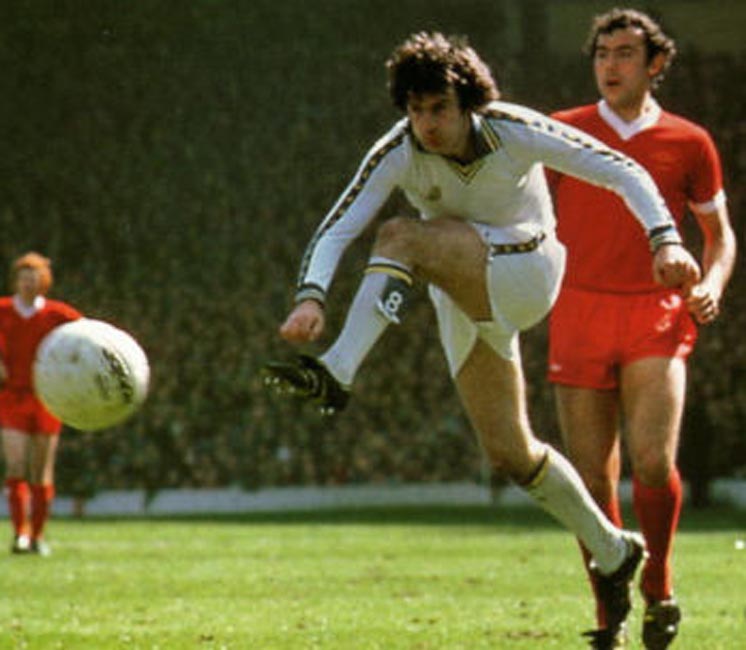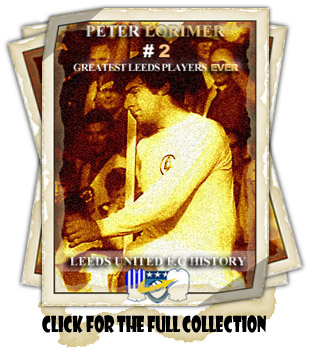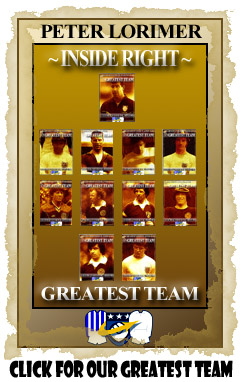

Lorimer: Peter Patrick (Peter)
1963-1979&1983-1986
(Player Details)
Forward/Midfield
Born: Broughty Ferry, Dundee: 14-12-1946
Debut: v Southampton (h): 29-09-1962
5’10” 11st 2lb (1970)
#2 in 100 Greatest LUFC Players Ever

Inside Right in Greatest LUFC Team

Lorimer once scored one hundred and seventy-six goals in one season for
Stobswell School, Dundee, and represented Dundee schools and played for Broughty
YMCA. He played for the Scottish Under-Fifteen team while he was still only
thirteen and scored twice as Scotland beat England 4-2 in the 1961-62 season. Don
Revie was in such a hurry to sign him that he was stopped for speeding on his way
north. Lorimer signed in May 1962 and won Scottish Amateur caps on a tour of
Kenya before turning professional in December 1963. Lorimer, possessor of one of
the hardest shots in the game, is the only player to have netted over two hundred
goals for Leeds. He is the club’s youngest debutant, making his bow when he was
fifteen years and two hundred and eighty-nine days old. He only made one League,
and one League Cup, appearance in the next two seasons. He recovered from a
fractured leg to establish himself in the first team in the 1965-66 season,
making thirty-four League appearances and scoring nineteen goals, more than any
other player at Leeds United managed that season. Thereafter his place and No.7
shirt was assured for the next decade and beyond. A skilful and industrious
player who operated best in a drifting position either wide on the right, but not
as an orthadox winger as he was more likely to cut in and shoot than stay wide
and cross, Normally he operated behind two main strikers, usually Allan Clarke
and Mick Jones. Lorimer was a frequent and often spectacular goalscorer and
earned himself several nicknames stemming from his powerful shooting, Hot Shot,
Thunder Boots and Lash were the main favoured ones. He became renowned for those
fearsome strikes, with his shots reaching supposed speeds of up to ninety mph,
whereas in fact he was recorded at 76.8 mph. He won Scottish Schoolboy, Scottish
Youth and two under twenty-three caps, on 3rd December 1969 in a 4-0 win over
France at Hampden Park, when he scored twice and on 14th January 1970 at
Pittodrie in a 1-1 draw with Wales, and made his full international debut on 5th
November 1969, in a 0-2 loss to Austria in Vienna, when he came on as a
substitute for the last twenty minutes in place of Hugh Curran of Wolverhampton
Wanderers in a European Cup Qualifier. With Leeds United, Lorimer won the League
Cup and Inter-Cities Fairs Cup in 1967-68, their first major trophies under Revie,
and Lorimer scored thirty goals during that season. He again featured prominently
as Leeds clinched their first League championship in 1968-69. In 1970, Lorimer
was in the side which chased a dream "treble" of League championship, F.A. Cup
and European Cup, though they famously ended the season with nothing. Lorimer
ended that season with nineteen goals again. In the summer of 1981 Lorimer
guested for Cape Town City in South Africa, along with Francis Lee for the team
that was managed by Frank Lord. He scored eight goals in six games. John Giles
had also played for John "Budgie" Byrne's Durban City in the same League. It was
to have an unfortunate consequence for Lorimer as the Scottish selectors had
wanted him for Scotland and he could not break the commitment. It resulted in his
being banned by Scotland. Leeds had won the Inter-Cities Fairs Cup once more in
1970-71 and then finally won the F.A. Cup in 1971-72. Lorimer picked up winner's
medals in both, scoring twenty-nine goals in the Cup winning season, including
his best seasonal League tally of twenty-three. A year later, Leeds United were
back at Wembley to defend the Cup against Sunderland and Lorimer became part of
F.A. Cup folklore after an incident in the second half. Unwisely, Lorimer had
said in an on-pitch interview with the BBC in the hours before the game that he
expected an exhibition performance from Leeds United if they could score early.
They didn't and as the second half reached its midway point it was Sunderland who
led 1-0 and Leeds United seeking to equalise. Pushing men forward to support the
strikers and find the equaliser meant that Lorimer was one of several Leeds
United players in Sunderland's area when the ball was laid back to full-back Paul
Reaney to put a high ball across to the far post. Fellow full back Trevor Cherry,
making a late and fast run into the area, met the ball with a meaty diving header
which was palmed out brilliantly by Sunderland keeper Jim Montgomery. The ball
fell to Lorimer, six yards out and the open goal in front of him, and he hit his
shot duly towards the target only for Montgomery, somehow, to react and spring
back to his feet, extending an arm at the same time and diverting the ball on to
the crossbar and away. Up in the commentary box David Coleman screamed, "And
Lorimer makes it one each!", but he and everyone else in the stadium were wrong.
Lorimer and Jones had even begun to celebrate the goal before they realised the
ball had not crossed the line. Sunderland held on to win 1-0. Leeds United
subsequently lost the European Cup Winners’ Cup final to AC Milan by the same
scoreline. Meanwhile Lorimer had been increasing his Scottish Caps. On 15th May
1971, he had received his second cap in a 0-0 draw with Wales at Ninian Park,
Cardiff, followed by another three days later his third in a 0-1 loss to Northern
Ireland at Hampden Park. Then came the ban, and it was not until the appointment
of Tommy Docherty as the Scotland coach that he was recalled, because of
Docherty's insistance of being able to pick his best players. A year later, on
20th May 1972, he scored his first full international goal in a 2-0 win over
Northern Ireland at Windsor Park, Belfast, after coming on as a substitute, for
Jimmy Johnstone of Celtic, and he quickly added another, just four days later
with a powerful shot from distance for the only goal in a win over Wales at
Hampden Park, but three days later he gained his sixth cap as England triumphed
at the same venue by 0-1. Scotland were involved in a World Cup Qualifiers group
with Denmark and Czechoslovakia and were off to a flying start with a 4-1 win in
Copenhagen as Lorimer picked up his seventh cap in Copenhagen on 18th October
1972, but after he had scored the second goal in a 2-0 win in the reverse fixture
at Hampden Park on 15th November 1972, Lorimer was sent off with his man-marker
Per Roentved and though he was able to play in a 0-5 humiliation by England at
Hampden Park on 14th February 1973, when he was credited with an own goal when a
shot glanced off his head, and he had claimed his tenth cap in a 0-1 defeat by
England at Wembley on 19th May 1973, he was suspended for the vital clashes with
Czechoslovakia and he also missed the friendlies against Switzerland and Brazil
in the lead up to those games, in which Scotland went through to the Finals
thanks to Joe Jordan's winner. In 1973-74, Lorimer had a fine season in a Leeds
United team which proved almost invincible. They started the season with an
unbeaten run of twenty-nine League games and coasted to their second title under
Revie. Lorimer's season was crowned with a place in Scotland's squad for the 1974
World Cup in West Germany, and he scored in the group game against Zaire. He had
gained his eleventh cap as a substitute for Jimmy Smith of Newcastle United in a
1-1 draw with West Germany at Hampden Park on 14th November 1973 and he played a
full game in the 2-0 win over England at the same venue on 18th May 1974 as
Scotland prepared for their World Cup assault. He played in the 1-2 loss to
Belgium in Bruges on 1st June 1974 and the 2-1 win over Norway in Oslo five days
later in the pre-World Cup warm up friendlies. He scored his fourth Scotland goal
in his fifteenth international appearance, with a twenty yard volley, as Scotland
beat Zaire 2-0 in Dortmund on 14th June 1974 and then he played in the two other
crunch games in the group fixtures as Scotland drew 0-0 with Brazil four days
later in Frankfurt and then four days after that drew 1-1 with Yugoslavia at the
same venue, but though undefeated Scotland were eliminated on goal difference.
Another eventful season with Leeds United followed for Lorimer, as he continued
to score goals, managing four as Leeds United progressed to their first European
Cup final. Held in Paris, they played Bayern Munich and lost 2-0, with Lorimer
having a goal disallowed due to a dubious offside decision given against captain
Billy Bremner. That was the last major trophy for which the team built by Revie,
who had left the year previously to manage England, would compete, and the ageing
team began to break up. Lorimer made his final four appearances for Scotland in
the European Championship Qualifiers to bring his tally to twenty-one. On 20th
November 1974 he came on as a substitute, for Dixie Dean of Celtic, as Scotland
went down 1-2 to Spain at Hampden Park, then on 3rd September 1975 he took part
in a 1-0 win over Denmark in Copenhagen and got his twentieth cap in the reverse
fixture at Hampden Park in a 3-1 win on 29th October 1975. His twenty-first and
final appearance came in a 1-1 draw with Romania at Hampden Park on 17th December
1975, when he came on as a substitute foe John Doyle of Celtic, when he was still
not thirty and he continued to play as an experienced head amidst a new
generation of Leeds United players. Mediocrity summed up the rest of the 1970’s
for Leeds United and Lorimer was no longer a regular player. His thunderous
shooting had helped Leeds reap a rich harvest of honours but a £25,000 move took
him to Toronto Blizzard in March 1979. He returned to England that September to
sparkle in York City’s ranks, scoring eight times in twenty-nine appearances,
before going back to Canada in March 1980. He had two seasons at Toronto Blizzard
and scored eleven goals in forty-seven appearances. He then became Johnny Giles'
Assistant as player-coach of Vancouver Whitecaps, where he played three seasons
from 1981 to 1983 and scored twenty-two goals in eighty appearances. He was
thirty-seven when he rejoined Leeds in December 1983 and was older than his
Manager Eddie Gray. He played a key role in midfield and overhauled John Charles’
League aggregate before moving to Whitby Town in December 1985. He had a brief
spell as player-coach in Israel with Hapoel Haifa before returning to Leeds to
enter into the hospitality trade and eventually to run the Commercial Hotel,
between the Leeds City centre and Elland Road. Lorimer has remained a positive
and dedicated spokesman on the club since retirement and he is always the first
ex-player broadcasters and journalists turn to when the club is in the news. He
worked as a pundit at games for BBC Radio Leeds and as a columnist for the local
paper, the Yorkshire Evening Post. In 2004, with the club on its knees
financially, Lorimer acted as a go-between who liaised between potential
benefactors and supporters as a rescue plan for the club was launched. He became
a fans' representative on the Board of Directors who also deals with the media
on club issues. He was the only person to remain on the board after Ken Bates’
takeover of Leeds in 2005 as Bates felt his role as fans' representative was
important and would help with relations with the Leeds United fans.